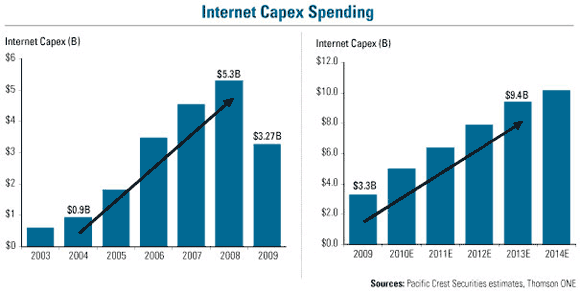There’s growing congestion on one of America’s highways and reports say the problem will only get worse. In just the past few years, America’s technological network—our information superhighway—has gone from hare to tortoise. Dropped calls, Internet outages and surfing at a snail’s pace now seem to be commonplace.
One of the main causes of the congestion is the exponential growth of smartphones. Did you know that the new 4G iPhone uses the equivalent network capacity of 200 older generation cell phones?

Earlier this year when Apple sold 1.7 million of them in just three days, it was the data equivalent of dumping 340 million new cell phones into the system at once—no wonder there were problems. It isn’t Apple’s (or AT&T’s) fault so many people wanted their product, but it does highlight the investment opportunity.
According to tech research firm PacificCrest, the global technology buildout is a $200+ billion opportunity over the next five years. The infrastructure needs include $100 billion to relieve congestion and $50 billion for boosting networks by upgrading Internet protocols. PacificCrest also estimates $54 billion is needed for new routing systems to improve data flow.
PacificCrest says we’re entering the next phase of the Internet infrastructure build cycle as big firms boost their capital spending to alleviate bottlenecks and accommodate technological improvements.
During the last cycle (2004-2008) the top five Internet firms spent roughly $15 billion on infrastructure, but that figure is expected to jump to $28 billion over the next four years.

The infrastructure upgrades and additional networks are important because much of the world still isn’t connected. There are 183 billion emails sent each day, but 78 percent of the world’s population still doesn’t have email. There are roughly 6 billion devices (4.6 billion mobile phones, 1.2 billion computers) hooked up to the Internet today, but less than 10 percent of those have high-speed access.
As more people—especially in the developing world—join the broadband and mobile communities, immense strains will be placed on the global network over the next few years. There should be substantial opportunities to participate in this buildout along the way.
The following securities mentioned in the article were held by one or more of U.S. Global Investors family of funds as of 6/30/10: Apple, AT&T
Disclaimer: This page contains affiliate links. If you choose to make a purchase after clicking a link, we may receive a commission at no additional cost to you. Thank you for your support!


Leave a Reply